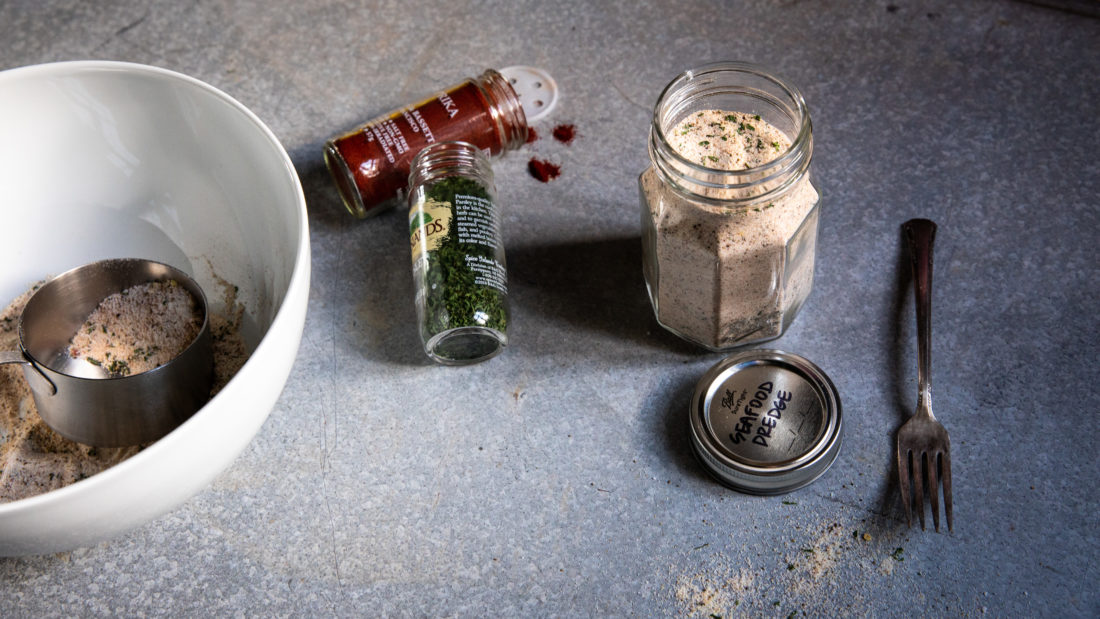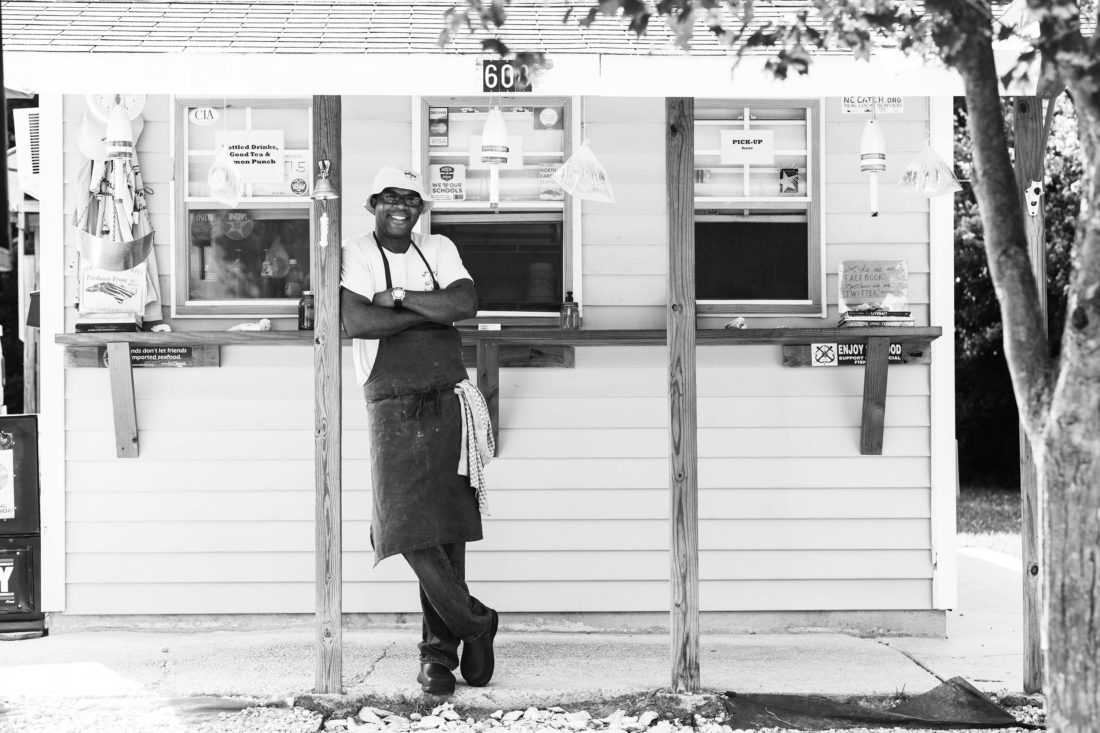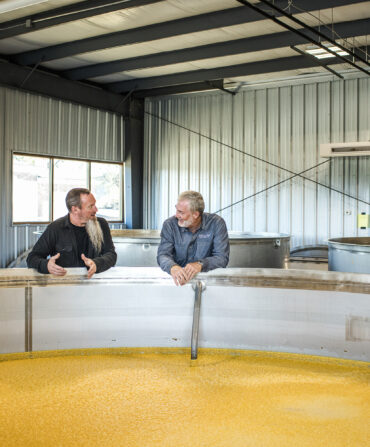Ricky Moore couldn’t wait to get away from the small area of North Carolina where he grew up. Raised near New Bern, around the rivers and sounds of Eastern North Carolina, his father was in the military, so he had already seen places like Germany. And he couldn’t wait to see more of the world for himself.
“I got that traveling bug,” Moore says. “When I graduated high school, I was ready to go. I didn’t want to sit in a classroom.” He enlisted in the army and discovered cooking the military way, from feeding troops in combat field units to feeding officers in the generals’ mess.
After that, he kept going. He did stages—kitchen internships—for such chefs as Charlie Trotter, Art Smith, and Rick Bayless. He cooked French, Italian, Lebanese , and modern Southern, always keeping his notebook, always trying to figure out what made one restaurant different from another.
“The goal was to be a skilled craftsperson. At the end of the day, cooking is cooking. It’s the behavior you try to investigate—why is a Michelin restaurant a Michelin restaurant? It’s the behavior.”
Eventually, Moore and his wife, Norma, wanted to come home to North Carolina to raise their kids, daughter Hunter, 15, and son Greyson, 10. Moore was working at a small market in Carrboro when Norma gave him an idea: She was craving a good fish sandwich.
Moore spotted a tiny building, basically a hot dog stand. It was all of 205 square feet, a walk-up window and outside tables. But it reminded him of something: He had once visited Singapore, where vendors in the night markets fascinated him. He calls it his “aha” moment: A single cook, minimal equipment, just making one thing but doing it really well.
Moore had grown up fishing and crabbing, and he knew what his one thing would be: Local fish and seafood.
“I wanted to do my own thing. I didn’t want investors, I didn’t want to do a food truck. I wanted to do something small, just a small little place that folk can connect with and see a person in there working hard.”

Moore now has two locations of Saltbox Seafood Joint in Durham, the original walk-up and a small sit-down restaurant. And now he has his first book, Saltbox Seafood Joint Cookbook, focusing on fish and shellfish and the things that go with them, including stews, chowders, and plenty of grits.
People are notoriously afraid to cook fish. What’s the key to getting over our fear?
Purchase what you know, get the fish you grew up eating. First, make sure it’s fresh, make sure it’s local. Second, don’t overthink it. Fish is delicate. Baking fish is a simple method. It doesn’t take rocket science to flavor it with a little bouquet of herbs around it. Olive oil, salt, pepper. Put it in a hot oven and sear it. And that’s it. Put a little salad around it. Done. Master that technique. The more you do it, over and over again, the more confident you get.
Your first location of Saltbox was smaller than a food truck. What did you learn from working in such a small space?
I treated it as a station in the kitchen. I’m working the fish station, that’s it. Every day, I set up my station. I customized every move, everything in arm’s reach. I did trial and error, I cut out steps that I needed to get that food out. I was very planned out, through the whole week. The beauty is, I had fresh fish coming in daily. The joy and motivation was coming in every day and starting by butchering my fish.
In your restaurants, you have what you call the “Trust Me Menu,” to get people to try something they haven’t had. What kind of things would I find on it?
Triggerfish. Sugar toads. Triple tail. Lionfish. Mullet. Bluefish. In this market, folk who know seafood only know shrimp, oysters, and flounder. That’s the cultural conditioning. Even though there’s plenty of native species, that’s what everybody sold. For me, all those fish (I named) are common. But people were like, ‘what’s mullet?’ I’d cook the shrimp and oysters so you know I know how to season stuff. And then I’d take it up to the next level: ‘You know I cook these, you should try this. Maybe you might just like it. Trust me.’
You write that the Calabash style of fried seafood along the coast is about using corn flour instead of cornmeal for frying fish. What’s the difference?
Corn flour is finer. You fry something in cornmeal, there’s a bit more texture. If I’m cooking fresh seafood, the lighter the dredge, the better. It doesn’t take too long (to cook), you’re not trying to eat through something so thick, you’re not tasting the fish. That is the nuance—corn flour.

MORE: GET THE RECIPE FOR MOORE’S
ALL-PURPOSE SEAFOOD DREDGE
When you go to the beach, what do you always pack along for the kitchen?
I’m always going to bring some sort of mirepoix preparation, some kind of aromatics. Some olive oil. Some sort of herb, particularly thyme. I’m going to bring some sort of seasoning paste—olive oil, garlic, parsley, chiles, anchovies, mixed together. Then I’ve got a base and I can do a quick fish stew or steam clams. Give me a base of seasoning and I can riff on anything. You don’t want to carry food, you want to carry bases of flavor. You can get your fish, your protein, anywhere. But bring your arsenal of flavors. And keep it really simple and pure.
You write about how you grew up crabbing and fishing all around New Bern, even on the river behind Tryon Palace. Do you still get out and fish these days?
I’ll be honest—I just can’t find time. I need to take my son, Greyson. I want to, I long for it. Growing up, it was like normal, like playing marbles. It wasn’t like a big chore. We’d throw sticks up in a pecan tree, fill a bag with nuts, sell them and that’s how we got chicken necks, which were cheap. Tie them with a little string and toss them in the water. It was fun—little kids coming home with a big bucket of crabs.
Garden & Gun has affiliate partnerships and may receive a portion of sales when a reader clicks to buy a product. All products are independently selected by the G&G editorial team.








